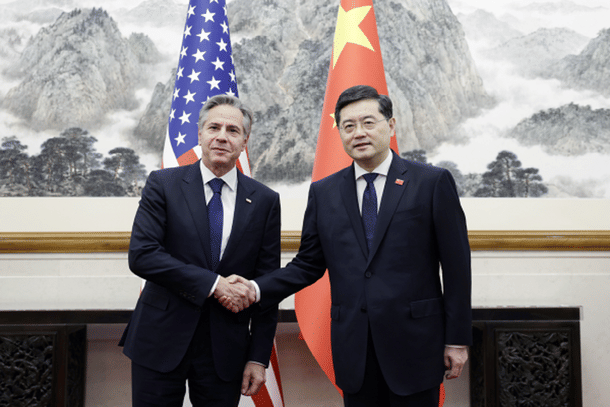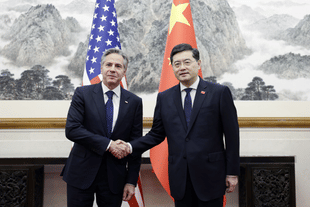World
Blinken In China: Are Beijing And Washington Rethinking Their Relationship?
Swarajya Staff
Jun 19, 2023, 10:42 AM | Updated 10:42 AM IST
Save & read from anywhere!
Bookmark stories for easy access on any device or the Swarajya app.


US Secretary of State Antony Blinken has held a meeting with China's Foreign Minister Qin Gang in Beijing, marking a significant step in an attempt to revive the strained relationship between the two countries.
This visit is the first by a US secretary of state to China since 2018, partly due to the strict Covid-19 lockdowns in Beijing and the deteriorating state of US-China relations.
Although it remains uncertain whether Blinken will meet President Xi Jinping, he spent five and a half hours in discussions with Qin and extended an invitation for further talks in Washington.
During the meeting, Blinken emphasized the importance of diplomacy and open communication across various issues to mitigate the risk of misunderstandings and miscalculations. Qin reiterated Beijing's commitment to establishing a stable and predictable relationship with the US but also stressed that Taiwan remains a core interest and a significant risk factor in China-US ties.
The US has expressed concerns about China's military activities around Taiwan and its failure to condemn Russia's invasion of Ukraine. In return, China accuses the US of attempting to contain its ambitions through export controls on advanced technology and strengthened security alliances with regional partners.
Relations between the two countries reached a low point following an incident involving an alleged Chinese spy balloon flying over sensitive US military sites, which resulted in its interception by the US in February.
Blinken's visit aims to follow up on the commitment made by President Joe Biden and Chinese President Xi Jinping during their meeting in Bali in November to establish a foundation for the bilateral relationship. However, the plan was disrupted when Blinken canceled his visit to China due to the aforementioned balloon incident.
In recent weeks, there have been signs of potential improvement in US-China relations. The Financial Times had reported a secret visit by CIA Director Bill Burns to China in May, and in the same month, US National Security Advisor Jake Sullivan met with China's top foreign policy official, Wang Yi, in Vienna.
President Biden also expressed expectations of an imminent thaw in relations at the G7 summit in Hiroshima, Japan. While one senior US official believes that relations are now in a place where progress can be made, others caution that the road ahead will be challenging.
The goals of Blinken's visit include the establishment of communication channels to prevent competition from escalating into conflict.
The decision by President Xi not to meet with Blinken, whom he was scheduled to see in February, could be viewed as a strong signal that Beijing remains concerned about US efforts to reduce economic dependence on China, including restrictions on advanced technology development.
The US export restrictions and China's tightening of anti-espionage laws and crackdown on foreign consultancies have also dampened investor sentiment.
However, in a recent rebuke, China's foreign ministry accused the US of damaging its interests while claiming to seek communication, indicating the challenges faced in pursuing a quick thaw.
In Washington, the Biden administration faces criticism from Republicans who view the engagement efforts with Beijing as ineffective.




